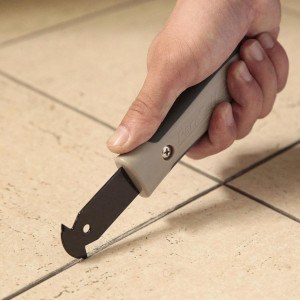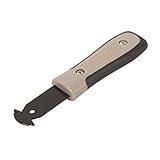Best Way To Cut Cement Board – Which Tool to Use? – Reviews & Top Picks
-
Pete Ortiz
- Last updated:

You may know that cement backer board is the perfect base layer for tiling over plywood or drywall, but if you’re ready to start a big project, you want to do it right. Determining which tools will make your job the smoothest can send you to your local hardware store on many frustrating trips. Or it can leave you breaking your new tiles with your forehead in aggravation.
Fortunately, we’ve designed this guide to help you pick the correct method and the right tools to get the job done efficiently. Our reviews not only highlight tools, but we’ve picked our top models to take all the annoying guesswork out of finding the best one.
A Brief Word of Warning
Before we start the deep dive into the best tools to cut cement board, we must talk about Black Lung Disease. Cement board contains silica dust, which is a toxic crystalline mineral and the primary catalyst for black lung or pneumoconiosis.
Before you start cutting, ensure you have goggles and a respirator, and only make your cuts outdoors. We recommend you purchase a Gerson Silica & Concrete Dust Respirator Kit before you start your project. Also, remember that even if you use a knife or scoring tool, you’ll leave dust on your cutting floor. Don’t sweep the dust with a broom, or you’ll just kick it up in the air. Stick with a HEPA filter vacuum or wet mop to clean it up.
Comparison of our Favorite Picks for 2025
| Rating | Image | Product | Details | |
|---|---|---|---|---|
Our Preferred Method

|

|
GOLDBLATT INDUSTRIES G02737 |
|
CHECK PRICE |

|

|
SKIL 5280-01 |
|
CHECK PRICE |

|

|
Bosch T367XHM3 |
|
CHECK PRICE |
|
|

|
MulWark Heavy Duty Retractable Knife |
|
CHECK PRICE |
The 4 Best Tools for Cutting Cement Board
1. A Carbide-Tipped Scoring Tool – Our Preferred Method
If you want to “get ‘er done,” a carbide-tipped scoring tool is your best friend. All you need to do is grab a straight edge for guidance and run your scoring tool along the cut line. Then, stand the board up, brace it behind the cut line with your knee, and bend. The board will snap cleanly where you’ve scored it.
Then you can trim the mesh on the opposite side with a utility knife, and boom! You’re done. This method will also leave you much less toxic dust to clean up afterward. While this may not be the best method for cutting curves or drilling holes around pipes, it’s perfect for straightforward jobs and the most economical, which is why we love it. It’s also the easiest way to cut fiber cement board if that’s your gig. Below is our top pick for an excellent carbide-tipped scoring tool.
We recommend the GOLDBLATT INDUSTRIES G02737 Carbon Scoring Knife:
- Scores all types of cement based backer board
- Three tungsten carbide tips
- Contoured soft grip handle
- Economical
- Carbide tip is more durable than a utility knife
- Lightweight
- Minimal dust
- Not great for curved or circular cuts
2. A Circular Saw with Carbide-Tipped Blade
If you didn’t read our “Brief Word of Warning” about silica dust above, this is your chance to scroll back up and read it. A circular saw is a great tool for quick, efficient, and versatile cuts, but it creates a large cloud of silica dust. However, if you’ve heeded our advice and are properly masked and goggled, this can be a great tool for getting the job done.
As with the scoring tool, you’ll want to use a carbide-tipped saw blade for durability. But to get the smoothest edge and churn up the least dust, go with fewer teeth on your blade (24 teeth at max, and even less is better). Make sure you make your cut slow and steady to keep it clean and precise. Below is our top pick for a circular saw, which comes equipped with a great blade for cement board.
We recommend the SKIL 5280-01 15-Amp 7-1/4-Inch Circular Saw with Single Beam Laser Guide:
- Powerful 15-amp motor delivers 5 300-RPM for greater speed and faster cuts
- 7-1 4-inch carbide-tipped blade included. Spindle lock for easy blade changes.
- 51° bevel capacity with a positive stop at 45° for a wide variety of cuts
- Lightweight and easy-to-use
- Comes with a perfect blade (and is easily interchangeable)
- Good price point
- Single-beam laser guide
- More dust than score-and-snap method
- Depth adjuster can be tricky to lock in place
3. A Jigsaw
This is probably a good time to re-emphasize that the score-and-snap method works like a charm with a scoring tool. However, many people find using a drywall utility knife to score the cement board just as simple. While this method is undoubtedly viable, keep in mind that you’ll probably find yourself replacing your blades often (snap-off blades are a great solution to this).
On the upside, you can get away with using only one tool to score the board and cut the mesh, saving you some time. It’s also economical and nearly dust-free, which is why we’ve included it here. Below is our pick for a good quality utility knife strong enough to stand up to repeated cement board scoring.
We recommend the Bosch T367XHM3 5-7 TPI Carbide Edge T-Shank Jig Saw Blades for All-Purpose (3 Piece), 5-3/16″:
- Carbide brazing technology – delivers 10x life versus standard bi-metal blades in wood with nails and screws
- Heat-optimized manufacturing – designed to resist heat buildup for heavy-duty cuts
- Progressor technology – increases speed and blade life through a combination of aggressive small teeth and larger teeth
- Low vibration to prevent fatigue
- Easy blade changes
- Shoe cover to protect surface scratches
- Good power
- More dust than score-and-snap method
- Cuts are slower than circular saw
- Teeth can wear down quickly
4. A Utility Knife
Here is another dusty option, but as mentioned above, a jigsaw can be a great tool if you have the right gear ready for cutting. They are especially great for cutting curves (which could work nicely in tandem with a scoring tool) or circles. You can also use a carbide drill bit to start on a circle and then widen it with the jigsaw.
If you’re steady with your hands, this will give you the versatility the other tools lack. On the downside, extra dust and a longer cutting time can be problematic. You’ll also probably need several extra replacement blades, as they can dull out quickly on cement board. Below is our top pick for the perfect jigsaw and some good carbide blades to go with it.
We recommend the MulWark Heavy Duty Zinc-Alloy SK4 Snap-Off Easy Loading Retractable Razor Utility Knife:
- ▲ Supreme Cutting Performance - The 15pcs self-loading quick change 18mm rust resistant retractable snap away blades are all made of...
- ▲ CONVENIENT BLADE CARTRIDGE - Unlike folding knifes, this self loaded large snap construction knife can store up to 6pc 18mm...
- ▲ QUICK BLADE CHANGING - Push the slider up to the end and backwards to its original position, you can fast remove and refill razor...
- Snap-off blades for quick change
- Heavy duty for construction
- Retractable
- Blades can dull quickly on cement board
Buyer’s Guide – Choosing the Best Way To Cut Cement Board
Whether you’ve decided to use a hand tool or a power tool, keep in mind when purchasing that carbide-tipped blades are best for cutting cement boards. Also, consider where you’ll be cutting and how much dust will be manageable for the area. If you’ll be near windows or open doors, use the lowest dust-emitting tool available (the scoring tool wins for minimal dust and efficiency).
A circular saw will speed up your project if you can easily manage the clean-up. If you’re tiling a bathroom, you’ll probably need a jigsaw to get good curvature in your cuts or for circular openings around pipes or toilets. Often, using a scoring tool for straight edges and a jigsaw for the rest is a perfect setup. Again, ensure you have goggles and a respirator (we recommend a Concrete Dust Respirator Kit) before you start cutting.
Conclusion
Now that you’ve read our reviews of the best tools to cut cement board and had a chance to mull over the best options, we hope you can confidently get started on your project. We know you’ll be successful with any of the previous methods or tools, but if you want the best bang-for-the-buck, easy-to-use method, grab a carbide-tipped scoring tool, and you’ll be in business. As always, good luck with your project. Now get out there and start cutting that cement board!
Contents







